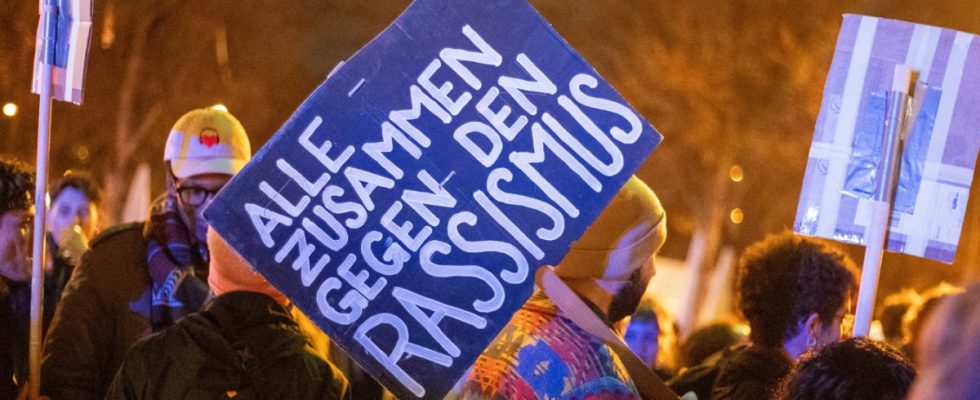For many people it is important to take a clear stance against the increasing right-wing shift in German society and the commitment to democracy. This is shown by the demonstrations in many German cities, including Munich on January 21, 2024. Nevertheless, there is a new study by the Ludwig Maximilians University for the city’s Department for Democracy that shows that Munich has a problem with group-related misanthropy. Anti-Semitism, discrimination and xenophobia are therefore increasing. The International Weeks Against Racism should now set an example against this. From March 11th to 24th there is a program in Munich with readings, city tours, films, lectures and more in almost all parts of the city, from the city center to Laim, Neuhausen and Hadern. Admission is often free, some you have to register for, others are only available online. The entire program can be found on the homepage city.muenchen.de.
Panel discussions
In various panel discussions, the payment card for refugees, racism in everyday life and colonialism are discussed. Jean-Pierre Félix-Eyoum, grand-nephew of Rudolf Duala Manga Bell, will speak to the museum staff on March 13th at 7 p.m. in the Five Continents Museum about the opportunities for the relationship between Germany and Cameroon. Bell, who studied law in the Empire and defended himself against the illegal activities of the colonial rulers, was executed by them 110 years ago.
On March 20th, the topic at the Munich Adult Education Center will be “What remains of the dawn of democracy? Reinterpretations of the upheavals of 1989”. The question is examined as to where the causes of current nationalist and right-wing extremist tendencies lie in Germany. Three professors who have published on the topic are sitting on the podium (7 p.m., MVHS Education Center, Einsteinstr. 28).
Lectures
A detail of the fencing of the Dachau Concentration Camp Memorial.
(Photo: Niels P. Jørgensen)
Lectures deal with topics such as antigypsyism, the border politics of the West and anti-racism work in the digital space. Dealing with anti-Semitism is also discussed, for example in the online lecture “The Dachau Concentration Camp Memorial in the Focus of the Right”. Conspiracy theory and justifications that the memorial has been confronted with since its opening are highlighted here. (March 13, 6 p.m.). Anyone interested in Germany’s colonial history should not miss the lecture “Between show business and diplomatic visits: Samoa ethnic shows in the German Empire”. A multi-year research project carried out in close collaboration with Samoan descendants provides facts about the people’s shows in Germany between 1895 and 1911 (March 19, 7 p.m., Museum Five Continents).
Workshops
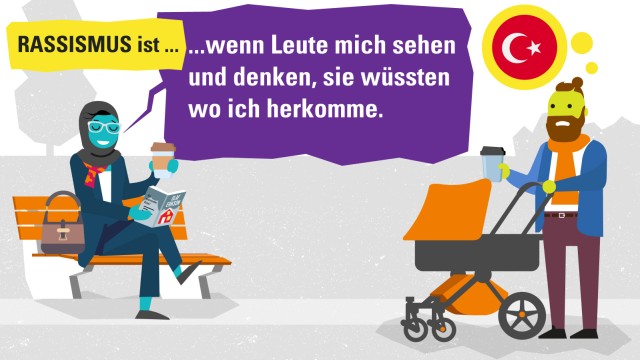
Racism is often not as far away as you think.
(Photo: Department for Democracy / State Capital Munich)
There are many opportunities to take action against discrimination yourself during the festival. Even children are addressed in craft workshops with topics such as “Show attitude!” or “Painting against racism”. In the parents’ café at the municipal daycare center, posters for the demonstration “Human rights for all!” (March 21st). The Jewish Museum on St.-Jakobs-Platz deals with religious plurality in our society (March 15, 10:30 a.m.). The next day at the event in the NS Documentation Center, people asked: “Surely one can say that. Radicalization of the majority society?” on current forms of anti-democratic and racist thinking (10 a.m.).
The Residenztheater’s workshop takes a playful approach to accompany the play “Blues in black and white”. It’s about the physical and psychological effects of racism (March 22, 8 p.m.).
Exhibitions
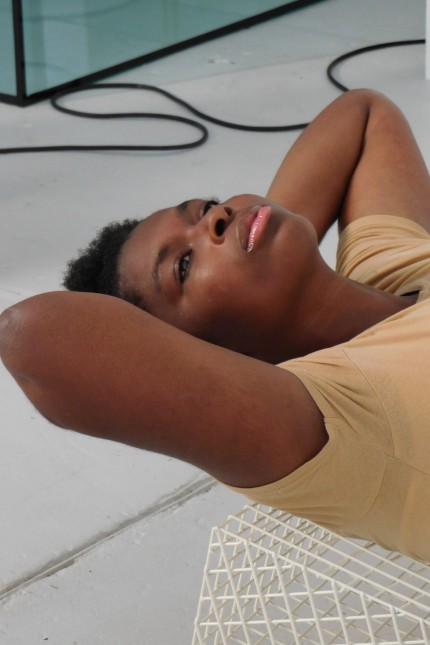
Mali portrays young women of color in “Decolonize Beauty.”
(Photo: Mali)
The Munich art scene is also involved throughout the entire festival period. In the photo project “We Ukrainians in Munich,” which was launched via social media, photographer Barbara Donaubauer photographed refugee Ukrainians in their favorite places and supplemented the images with interview excerpts. There will be a finissage with cooking together on March 21st at 7 p.m. in the Guardini90 district cultural center. In “Decolonize Beauty,” the photographer Mali portrays young women of color and focuses on their own characterizations with photos and texts (March 12, Munich Riem City Library).
The autobiographical and multimedia art project “Man speaks German” is also about gaps and exclusion mechanisms as well as everyday racism in today’s media landscape. In addition, a program for participation, discussions and workshops will be offered on several dates (March 16th to April 16th, art library, picture room).
Readings
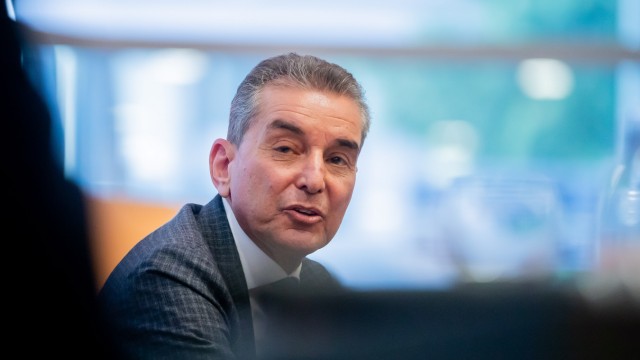
Michel Friedman is a philosopher and journalist.
(Photo: Christoph Soeder/picture alliance/dpa)
Michel Friedman is one of the festival’s most prominent guests. The former deputy chairman of the Central Council of Jews will present his new book “Judenhate” in the Kammerspiele theater on March 16th and then speak to the author and Federal Cross of Merit recipient Burak Yilmaz about anti-Semitism and the increasing popularity of the AfD (March 16th, 8 p.m.) .
The reading “Auerbach. A Jewish-German Tragedy or How Anti-Semitism Survived the War” also deals with the Jews in Germany. The author of the book, Hans-Hermann Klare, and the journalist Rachel Salamander talk about the Auschwitz survivor Phillip Auerbach, who fought for the survivors of the Shoah (March 17, 7 p.m., Jewish Museum). A public tour and workshop at the Dachau Concentration Camp Memorial will also focus on discrimination after 1945 (March 19, 2 p.m.).
Close-up reports characterize the double reading “The shimmering of the sea // I just want to be free”. It connects two people and their perspectives on Europe’s external borders in the Mediterranean. In his book “I just want to be free”, Filimon Mebrhatom describes his escape from Eritrea, his story is supplemented by projections from the graphic novel “The Shimmering of the Sea” by Adrian Pourviseh.
The author is a crew member of the Sea-Watch 3 and describes his work as a sea rescuer in words and pictures (March 20, 7:30 p.m., Munich City Library). Pourviseh will be giving his own reading on March 12th at 8 p.m. and will show the difficulties of sea rescue in the short documentary “Seabird – The Civilian Eye” (March 12th, 7 p.m.).
City tours and guided tours
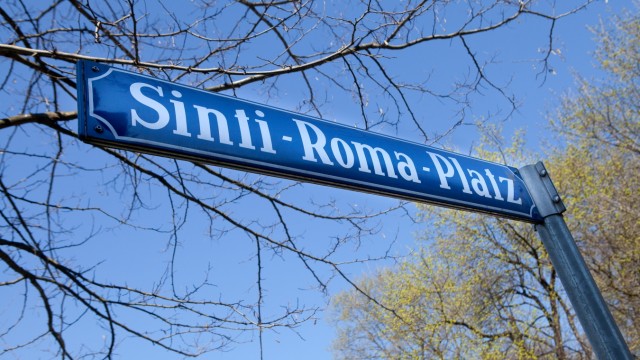
The Sinti-Roma-Platz in the Schwanthalerhöhe district of Munich.
(Photo: Florian Peljak)
The city of Munich combines diverse cultures, religions and social groups and their history. You can learn more about it on tours and guided tours. During the “Sinti and Roma in Munich” city tour, participants learn a lot about the eventful biography of these minorities (March 10th, 3 p.m., toy museum in the tower of the Old Town Hall). In keeping with this, there will be the memorial event “In memory of the deportation of the Munich Sinti and Roma” (March 13th, 7 p.m.) and the panel discussion on the exhibition “Gladly Seen: Sinti and Roma” (March 15th, 5 p.m.).
The city tour “On Jewish-Muslim footsteps through Munich’s old town” is also dedicated to groups that have been oppressed for centuries. It leads to lesser-known sides of the old town such as Munich’s first synagogue, the “Türkentor” and the “Luxury Mosque” (March 24th, 11 a.m., St.-Jakobs-Platz 16, meeting point foyer).
The city walk “Möhlstrasse. Then and Now” is also organized by the Jewish Museum. The well-known Bogenhausener Straße was an important center of life for the Jewish displaced people in the post-war period. The district and places from the exhibition “Munich Displaced. The Rest of the Rescued” are visited during the guided tour (March 16, 11 a.m., Friedensengel, Prinzregentenstraße) .
In addition to the Jewish victims of the Nazi era, the focus is also on their defenders and allies. The tour “The White Rose: A Message for Human Rights and Against Anti-Semitism” leads through the permanent exhibition in the White Rose Memorial near the LMU atrium. The timeless demands of the resistance group will be highlighted (March 16, 11 a.m., Brüder-Scholl-Platz).
Not only Jews, but also people of color were persecuted during the Nazi dictatorship. Using some of their biographies, the tour “Black prisoners in the Dachau concentration camp. Origin, biography and reasons for imprisonment” documents the reasons for their deportation (March 23, 14, Visitor Center of the Dachau Concentration Camp Memorial).
Further training
The training courses usually require registration and are primarily aimed at specialists. The online argumentation training “Argue! – About the democratic handling of fake news, populism and regular slogans” is open to all interested parties (March 13th, 6 p.m.). The training course “We and The Others – Dealing with Everyday Racism in Social Practice” (March 19, 10 a.m.) also explains everyday discrimination. The target group of the online events are, in particular, social work professionals, volunteers and teachers who are intended to be supported in dealing with anti-Semitism, for example in schools (March 12th and 13th, 9 a.m., Herrnstraße 19).

